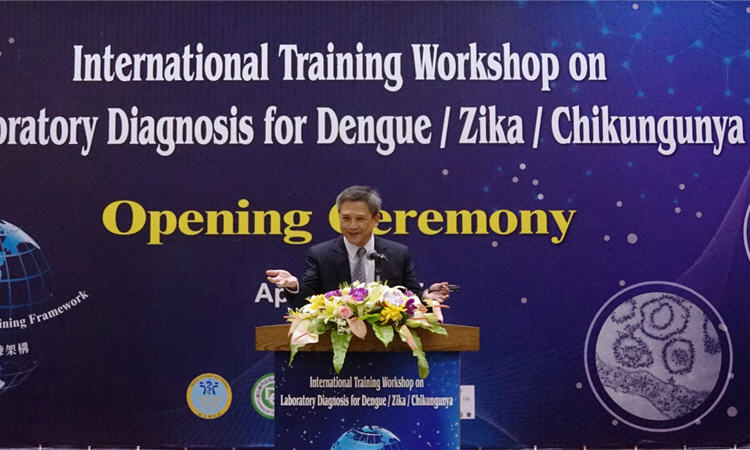April 25, 2017
AIT Official Text #: OT-1706E
Good morning, and welcome to Vice President Chen, Minister Chen, Minister Deng, Vice Minister Lee, along with our distinguished guests.
We are honored to have Vice President Chen and so many high-level officials here today to open this training course. Their presence signifies the importance we all place on the work you are doing here.
Let me extend our appreciation to Taiwan Centers for Disease Control Director General Dr. Chou and his team, as well as the Ministry of Foreign Affairs.
And to all our expert guests from other shores, welcome and thank you for being a part of this important effort.
This is the fourth public health program we have held under the U.S.-Taiwan Global Cooperation and Training Framework, or GCTF.
Since GCTF launched in June 2015, the United States and Taiwan have jointly held training workshops on MERS in August 2015, dengue fever in November 2015, and Zika in April 2016.
These GCTF training courses all built upon our earlier collaboration to fight the Ebola outbreak in Africa. Taiwan, in response to that horrible tragedy, donated funds and protective equipment to international relief efforts and later partnered with the United States to host a regional Ebola training workshop here in Taiwan. It was this experience that gave rise to awareness in the United States and Taiwan that we could be natural partners in addressing these kinds of global challenges.
Once again, the United States and Taiwan are partnering under the GCTF, with all of you here today, to address a pressing regional and global threat.
No one in the global community is immune to the spread of mosquito-borne viruses such as dengue, Zika, and chikungunya. One or all of these viruses have reached the communities of all those assembled in this room.
Compounding the challenge of taking quick action to protect vulnerable populations and prevent the spread of these diseases is that these viruses all display similar symptoms. That makes your job as health professionals even harder.
We are pleased to work with Taiwan CDC to share information on these mosquito-borne viruses, and best practices in accurately diagnosing them, with our friends and colleagues from around the world this week.
A special thank you to our colleagues from the Armed Forces Research Institute of Medical Sciences, who traveled here from Thailand to share their experiences and research on mosquito-borne viral diseases.
We deeply appreciate the contributions of all the medical experts from around the world who are with us today.
To our visitors, I applaud the great work that all of you are doing in your respective countries to fight these pandemics and other public health threats. We know that you have demanding schedules at home and we are so glad you set aside time to come and participate in this workshop.
Like all other global challenges, the response to mosquito-borne viruses will require exactly this kind of concerted, broad international effort.
We are delighted to have with us today Ambassador James Moriarty, Chairman of the Board of the American Institute in Taiwan.
Chairman Moriarty’s participation demonstrates how deeply the United States values our cooperation with Taiwan in this area.
It is our hope that the participants in this week’s workshop will leave here with a deeper understanding of the mosquito-borne diseases we are fighting, a greater appreciation of how important it is for the global community to come together to help each other in this battle, and a larger network of colleagues around the region, and world, including here in Taiwan, on whom you can call for assistance.
And I would now like to turn the stage over to Ambassador Moriarty. Thank you.
















![Video Thumbnail [Recovered]-01](../wp-content/uploads/sites/269/Video-Thumbnail-Recovered-01-1-750x450.jpg)






